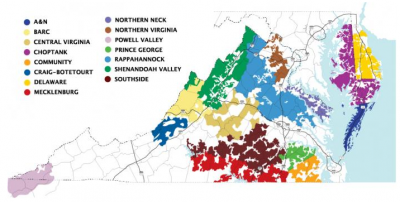[UPDATE: On December 4, the State Corporation Commission reschedule this hearing to allow time for attorneys in the case to file briefs. A new date has not been set; this blog will be updated again when it is.]
Rural electric cooperatives, established generations ago to ensure America’s rural communities had electricity, are set up as nonprofit, democratically governed entities whose customers are also member-owners. Over time, many of these co-ops became extremely insular, with board seats often passing among family members and official business being conducted well out of sight of the public’s view.
Increasingly, co-op members are rising up to reclaim stewardship of their electric utilities.
Next week, the State Corporation Commission in Virginia will begin deliberations on a complaint filed by members of Rappahannock Electric Cooperative (REC) to compel the co-op to open its board meetings to members. In May, REC’s members were denied the right to propose amendments to their bylaws when the board refused to provide the necessary petition. The changes they sought would improve transparency and democratic governance by opening board meetings, making it harder for the board of directors to control election outcomes with blank proxy forms, and requiring director pay (which is available through the IRS) to be shared in the membership magazine.
In response to the members’ filing, all of Virginia’s other 13 electric cooperatives piled on to a Motion to Intervene in the case. The Virginia, Maryland & Delaware Association of Electric Cooperatives signed on as well. If the REC members win, they would obtain the petition needed to get bylaw amendments voted on by co-op members. The co-ops see this as setting a bad precedent, claiming that “an adverse ruling herein could have an adverse effect on the corporate governance of other cooperatives in Virginia and elsewhere.”

Members of Powell Valley Electric Co-op show up in force for annual meeting September 2018. Photo courtesy of Lynn Tobey.
Interestingly, one of the interveners is Powell Valley Electric Cooperative (PVEC), which serves a small portion of Southwest Virginia and several counties in northeast Tennessee. A few months ago, PVEC’s board also blocked its members from voting on an open board meetings amendment even after a group of members seeking the reform followed all provisions for putting forth a proposal. Instead, the PVEC board claimed that their meetings had always been open and began posting meeting time and location information on their website. Members have encountered a number of governance concerns and are still working to hold an amendment vote in 2019 to officially open board meetings, as well as require that board minutes be posted publicly, and prevent the meetings from being closed by the board, as only members can change their bylaws.

Members of PVEC wait to sign in for the annual meeting in September 2018. Photo courtesy Lynn Tobey.
From Minnesota to South Carolina, the depth of governance issues at rural electric co-ops is coming to light with new calls for reform. In August, more than 1,500 members of Tri-County Electric Co-op in South Carolina attended a special meeting to remove all nine of their board members when they discovered the board had been paying themselves an exorbitant amount of money and benefits. Co-ops across that state have since promised to make changes to improve transparency, such as posting boarding meeting and executive pay information online. A recent scorecard in Minnesota reflects a need for similar reform at electric cooperatives there, and has inspired a conversation about the necessity of member access to information to ensure democratic governance.
Meanwhile, back in Virginia, REC’s Board Chair, Christopher Shipe, recently testified that open board meetings at the co-op “would hamper the board’s ability to adequately govern REC.”
As the Virginia SCC considers this matter, member-owners of electric cooperatives across the state are waiting to learn whether the commission will favor shining a light on the governance of these co-ops, or if they will be allowed to keep their members in the dark.




I, and I am sure many members of REC, regret that we have not offered more help in your effort to keep the co-op a co-op.
I seems the board of REC wants to be a Dominion Electric, Jr. who writes their own VA legislation then orders the vested politicians to sign it.
I appreciate all you do and I intend to stay abreast and participate more in your efforts toward REC transparency.
Irene Upshur
Rappahannock County, VA
I asked our co-op (CVEC) to explain the expenditure of $10,000 each, for two gazebos for employees to smoke cigarettes in.
Could not get Any answers.